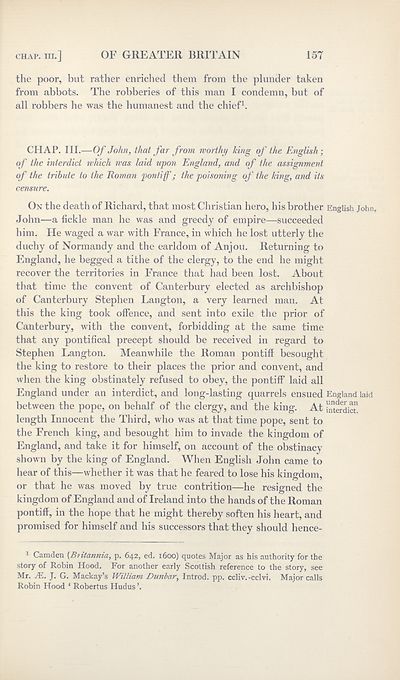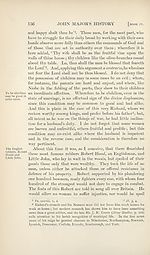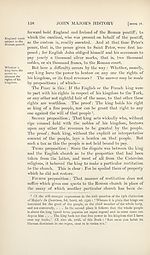Series 1 > History of Greater Britain, as well England as Scotland
(302) Page 157
Download files
Complete book:
Individual page:
Thumbnail gallery: Grid view | List view

CHAP. III.]
OF GREATER BRITAIN
157
the poor, but rather enriched them from the plunder taken
from abbots. The robberies of this man I condemn, but of
all robbers he was the humanest and the chief1.
CHAP. III.—Of John, that far from worthy king of the English;
of the interdict which was laid upon England, and of the assignment
of the tribute to the Roman pontiff; the poisoning of the king, and its
censure.
On the death of Richard, that most Christian hero, his brother English John,
John—a fickle man he was and greedy of empire—succeeded
him. He waged a war with France, in which he lost utterly the
duchy of Normandy and the earldom of Anjou. Returning to
England, he begged a tithe of the clergy, to the end he might
recover the territories in France that had been lost. About
that time the convent of Canterbury elected as archbishop
of Canterbury Stephen Langton, a very learned man. At
this the king took offence, and sent into exile the prior of
Canterbury, with the convent, forbidding at the same time
that any pontifical precept should be received in regard to
Stephen Langton. Meanwhile the Roman pontiff besought
the king to restore to their places the prior and convent, and
when the king obstinately refused to obey, the pontiff laid all
England under an interdict, and long-lasting quarrels ensued England laid
between the pope, on behalf of the clergy, and the king. At interdict!
length Innocent the Third, who was at that time pope, sent to
the French king, and besought him to invade the kingdom of
England, and take it for himself, on account of the obstinacy
shown by the king of England. When English John came to
hear of this—whether it was that he feared to lose his kingdom,
or that he was moved by true contrition—he resigned the
kingdom of England and of Ireland into the hands of the Roman
pontiff, in the hope that he might thereby soften his heart, and
promised for himself and his successors that they should hence-
1 Camden {Britannia, p. 642, ed. 1600) quotes Major as his authority for the
story of Robin Hood. For another early Scottish reference to the story, see
Mr. /E. J. G. Mackay’s William Dunbar, Introd. pp. ccliv.-cclvi. Major calls
Robin Hood ‘ Robertus Hudus ’.
OF GREATER BRITAIN
157
the poor, but rather enriched them from the plunder taken
from abbots. The robberies of this man I condemn, but of
all robbers he was the humanest and the chief1.
CHAP. III.—Of John, that far from worthy king of the English;
of the interdict which was laid upon England, and of the assignment
of the tribute to the Roman pontiff; the poisoning of the king, and its
censure.
On the death of Richard, that most Christian hero, his brother English John,
John—a fickle man he was and greedy of empire—succeeded
him. He waged a war with France, in which he lost utterly the
duchy of Normandy and the earldom of Anjou. Returning to
England, he begged a tithe of the clergy, to the end he might
recover the territories in France that had been lost. About
that time the convent of Canterbury elected as archbishop
of Canterbury Stephen Langton, a very learned man. At
this the king took offence, and sent into exile the prior of
Canterbury, with the convent, forbidding at the same time
that any pontifical precept should be received in regard to
Stephen Langton. Meanwhile the Roman pontiff besought
the king to restore to their places the prior and convent, and
when the king obstinately refused to obey, the pontiff laid all
England under an interdict, and long-lasting quarrels ensued England laid
between the pope, on behalf of the clergy, and the king. At interdict!
length Innocent the Third, who was at that time pope, sent to
the French king, and besought him to invade the kingdom of
England, and take it for himself, on account of the obstinacy
shown by the king of England. When English John came to
hear of this—whether it was that he feared to lose his kingdom,
or that he was moved by true contrition—he resigned the
kingdom of England and of Ireland into the hands of the Roman
pontiff, in the hope that he might thereby soften his heart, and
promised for himself and his successors that they should hence-
1 Camden {Britannia, p. 642, ed. 1600) quotes Major as his authority for the
story of Robin Hood. For another early Scottish reference to the story, see
Mr. /E. J. G. Mackay’s William Dunbar, Introd. pp. ccliv.-cclvi. Major calls
Robin Hood ‘ Robertus Hudus ’.
Set display mode to:
![]() Universal Viewer |
Universal Viewer | ![]() Mirador |
Large image | Transcription
Mirador |
Large image | Transcription
Images and transcriptions on this page, including medium image downloads, may be used under the Creative Commons Attribution 4.0 International Licence unless otherwise stated. ![]()
| Scottish History Society volumes > Series 1 > History of Greater Britain, as well England as Scotland > (302) Page 157 |
|---|
| Permanent URL | https://digital.nls.uk/127735389 |
|---|
| Attribution and copyright: |
|
|---|
| Description | Over 180 volumes, published by the Scottish History Society, containing original sources on Scotland's history and people. With a wide range of subjects, the books collectively cover all periods from the 12th to 20th centuries, and reflect changing trends in Scottish history. Sources are accompanied by scholarly interpretation, references and bibliographies. Volumes are usually published annually, and more digitised volumes will be added as they become available. |
|---|


